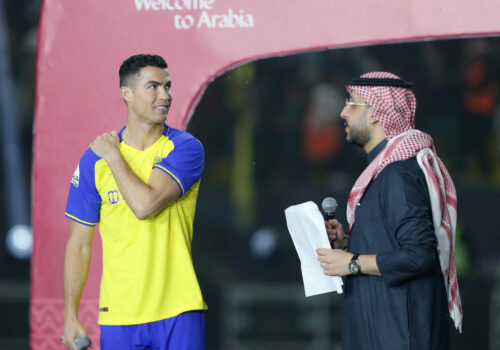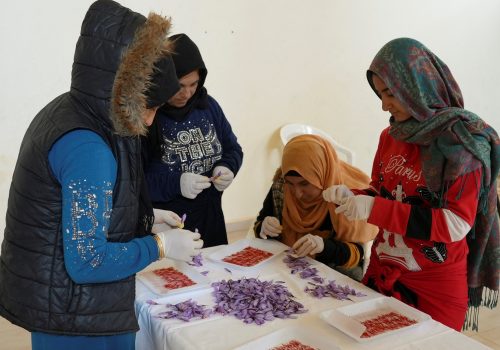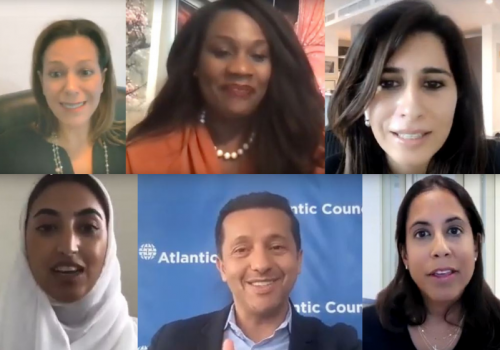Saudi women are learning financial literacy and it’s helping the country grow
Days after Saudi Arabia released the midway annual report on Vision 2030, its ambitious thirteen-year reform agenda, the World Economic Forum held a special meeting in Riyadh on global collaboration, growth, and energy for development on April 28–29. The pride that Saudis feel as hosts of a globally prestigious event, at a moment when they can showcase their achievements since the 2016 launch of the agenda, is palpable throughout the kingdom.
One overarching aim of the vision is to diversify the economy and, in doing so, to create new opportunities for work and investment at all levels—for both large-scale projects and small ventures. Changing the status of women has been a critical marker of change and success over the past eight years. In that time, the participation rate of women in the labor market, now around 35 percent, has exceeded the initial goal. Women working in new sectors are supported by various active labor-market policies and new laws to facilitate their work.
The Vision 2030 midway annual report features photos of women working alongside men across sectors, highlighting their importance in driving the economy forward. More than one million commercial registrations are owned by women—representing 45 percent of registered companies—and women held 43.7 percent of leadership roles. Government officials and analysts have openly celebrated this momentum, which continues to progress positively.
SIGN UP FOR THIS WEEK IN THE MIDEAST NEWSLETTER
While these advancements are welcome and worthy of celebration, it will be necessary to ensure that women have the financial know-how to grow in their careers and manage their new ventures effectively to achieve a sustainable level of empowerment, especially in an environment where traditional gender roles of male breadwinner and female caretaker have persisted for so long. Financial literacy is necessary for women who have managed to launch their own companies and who balance formal employment with other demands. Still, it remains true that women who remain on the fringes of the formal economy can face barriers to inclusion.
Financial inclusion ensures that those who demand funds recognize how to access them and ensure that the supply of funds is accessible, leading to a level of liquidity that can enhance growth and reduce poverty or an overreliance on state support. Since the launch of Vision 2030, economic developments have pushed women to be more independent and in control of their finances. Reforms to social welfare created more pathways out of poverty by replacing blanket subsidies with targeted support and new policies related to social insurance, social assistance, and the labor market.
However, these changes will initially benefit those who are younger and more digitally connected. The expansion of e-government and the crackdown on corruption have linked all kinds of payments to bank accounts, including salaries and alimony payments. Furthermore, small companies are required to issue e-invoices, and economic growth is driving out smaller commercial outlets that cater to those who might not be linked online to the formal economy through bank accounts. A 2018 King Khaled Foundation study reported that up to 6.9 million adults, 28 percent of the kingdom’s adult population, were “unbanked,” and 56 percent were women. Because property ownership is guaranteed to women by sharia law, bank accounts are available and accessible to women. A 2019 report in Alsharq al-Awsat highlighted that 20 percent of all bank deposits went into women’s accounts, an amount greater than $53 billion. Thus, women with lower levels of education and socioeconomic status are the ones who tend to be left behind due to cultural norms and low financial literacy—meaning that women resort to saving through informal channels and have limited awareness of the benefits of learning how to manage their money.
At the macro level, the kingdom’s economic reform policies are focused on facing economic shocks and ensuring sustainability and growth. This is also important on a micro level, as individuals must manage emergencies and income shocks through enhanced financial literacy. This will enable citizens to accumulate wealth and contribute to economic growth through increased savings and more measured spending. Improvements in financial literacy tend to be motivated by various factors, including overall economic growth and global competitiveness. Saudi Arabia’s National Savings and Financial Literacy Strategy outlines key objectives to improve financial literacy, including a target to address the low household savings rate of 1.6 percent. Globally, 10 percent is considered the minimum level for ensuring long-term financial independence.
While economic growth might be the overarching national motivation, international organizations are building programs that seek to empower individuals as well. The International Monetary Fund and World Bank have worked with individual countries to enhance financial literacy at the population level through targeted national programs, and the Organisation for Economic Co-operation and Development (OECD) has developed guidelines to support participating countries in improving financial literacy.
In tandem, economic reforms in the kingdom have sparked increased engagement with different financial tools. Because women and minorities tend to have lower financial literacy globally, often compounded by other factors such as limited educational backgrounds and socioeconomic status, these segments of society are usually the targets of financial-literacy programs. The most successful programs, such as the Khazna program launched by the Riyadh-based women’s charity, Al-Nahdha, are designed with such attitudes and challenges in mind.
Launched in 2017, Khazna aims to address the gap in financial literacy by targeting low-income women who are the financial decision-makers in their households. The curriculum stresses ways to save, reduce consumption, budget, and, above all, reduce debt. Khazna has expanded and evolved through feedback loops after each cohort goes through training. It is successful because it considers the communal family structures, the enduring stigma attached to women-led households, and the cultural obligations of generosity and giving. Other programs target women with varying levels of socioeconomic status and are led by banks and different government institutions.
Financial literacy is essential for social inclusion. Khazna is expanding to offer entrepreneurial training, beginning with key information about businesses and ending in a business plan that fills a gap in the market, with a community angle that ensures allyship and support.
As the number of women joining the formal economy within Saudi Arabia continues to grow, it will be important to build programs that circumvent the global traps of severe pay gaps, male-dominated decision-making, and implicit biases that favor men. This can happen if programs begin early as part of a joint effort within the national curriculum, and through community initiatives that bring together industry experts and educators as part of a lifelong approach to literacy.
While Khazna is one such example, funding for more programs that achieve the targets of the National Savings and Financial Literacy Strategy is key. This must expand beyond basic budgeting to include enhanced literacy on financial security and more complex issues such as home ownership and financial products that offer varying long- and short-term savings and investment opportunities. The programs must also consider women’s diverse backgrounds and the psychological barriers associated with managing money. True empowerment will come from increased agency and decision-making; for working Saudi women, this must be enhanced through elevated financial independence. Any successful program must be tailored to the needs of different categories of women so everyone can share a slice of the development pie.
Hanaa Almoaibed is a nonresident senior fellow at the Atlantic Council and a research fellow at the King Faisal Center for Research and Islamic Studies in Riyadh. Follow her on X: @hanaaalmoaibed.
Further reading
Thu, Jan 18, 2024
The real reason the Saudi government is investing in sports. Hint: It’s not to impress you.
MENASource By
Saudi Arabia’s big financial bets in the sports world are part of its broader Vision 2030 plan to diversify the economy away from oil.
Fri, Sep 29, 2023
Cultivating change: Women as catalysts for agricultural transformation in the MENA region
MENASource By Marcy Grossman
By engaging women in decision-making leadership roles and providing them with access to education and training, a wellspring of innovative solutions can be unlocked to address challenges in agriculture, food security, and water security.
Mon, Sep 20, 2021
‘Investing in women is just good business’: Ways to increase funding for women-led ventures in the Middle East
MENASource By Stefanie Hausheer Ali
On September 14, 2021 the Atlantic Council’s empowerME Initiative held a workshop on “Venture Capital Financing: How to Increase Funding for Women-led Ventures."
Image: Nouf al-Qahtani, Enablement Programs Manager at Saudi Human Resources Development Fund, works on the computer in the office in Riyadh, Saudi Arabia August 19, 2021. Picture taken August 19, 2021. REUTERS/Ahmed Yosri


